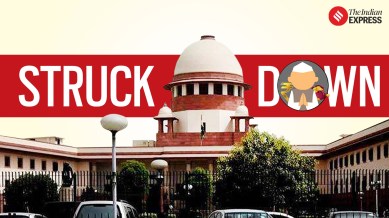
The Supreme Court on Thursday held the changes made in the law to introduce the electoral bonds scheme as unconstitutional, in a unanimous verdict on a batch of pleas challenging the legal validity of the Centre’s scheme which allowed for anonymous funding to political parties.
A five-judge Constitution Bench presided by Chief Justice of India D Y Chandrachud also directed that “the issuing bank shall herewith stop the issuance of electoral bonds” and asked the State Bank of India (SBI) to “submit details of the electoral bonds purchased since the interim order of the court dated April 12, 2019, till date to the Election Commission of India (ECI)”.
The bench said, “Section 29(c)(1) of the Representation of People Act, 1951, as amended by Section 137 of the Finance Act 2017, Section 182(3) of the Companies Act as amended by Section 154 of the Finance Act, 2017, and Section 13A(b) as amended by the Finance Act of 2017 are violative of Article 19(1)(a) and hence unconstitutional”.
The bench, also comprising Justices Sanjiv Khanna, B R Gavai, J B Pardiwala and Manoj Misra, said, “The deletion of the proviso to Section 182(1) of the Companies Act, permitting unlimited corporate funding to political parties is arbitrary and violative of Article 14”.Don’t miss | Highlights from Supreme court verdict on electoral bonds scheme
‘Company has a much graver influence’
Giving reasons, it said that the “ability of a company to influence the election process through political contribution is much higher when compared to that of an individual”.
“A company has a much graver influence on the political process, both in terms of the quantum of money contributed to political parties and the purpose of making such contributions. Contributions made by individuals have a degree of support or affiliation to a political association. However, contributions made by companies are purely business transactions made with the intent of securing benefits in return. The amendment to Section 182 is manifestly arbitrary for treating political contributions by companies and individuals alike”.
The apex court said, “Companies before the amendment to Section 182 could only contribute a certain percentage of the net aggregate profits. The provision classified between loss-making companies and profit-making companies for the purpose of political contribution and for good reason.. the underlying principle of this distinction was that it is more plausible that law-making companies will contribute to political parties with a quid pro and not for the purpose of income tax benefits”.Explained | Supreme Court strikes down electoral bonds scheme as ‘unconstitutional’: What issues did the verdict mention?
“The provision as amended by the Finance Act of 2017 does not recognise that the harm of contributions by loss-making companies in the form of quid pro quo is much higher. Thus the amendment…is manifestly arbitrary for not making a distinction between profit-making and loss-making companies for the purposes of political contribution”.
The court pointed out, “The purpose of Section 182 is to curb corruption and electoral financing. For instance, the purpose of banning a government company from contributing is to prevent such companies from entering the political fray by making contributions to political parties. Amendment to Section 182 by permitting unlimited corporate contributions authorises unrestrained influence of companies in the electoral process. This is violative of the principle of free and fair elections and political equality captured in the value of one person, one vote.”
Details of electoral bonds
The court also directed SBI to submit the details of political parties which have received contributions through election bonds since the interim order dated April 12, 2019, to date to the Election Commission. The details should include the date of purchase of each electoral bond, the name of the purchaser of the bond, and the denomination of the electoral bond purchased, said the court.
SBI must disclose details of each electoral bond encashed by political parties which shall include the date of engagement and the denomination of the electoral bonds”, the court said. The court added, “SBI shall submit the above information to the ECI within three weeks from the date of this judgement that is by March 6, 2024”.
The court asked ECI to publish the information shared by the SBI on its official website within one week of receiving the information, that is by March 13, 2024.UPSC PACK© IE Online Media Services Pvt Ltd
